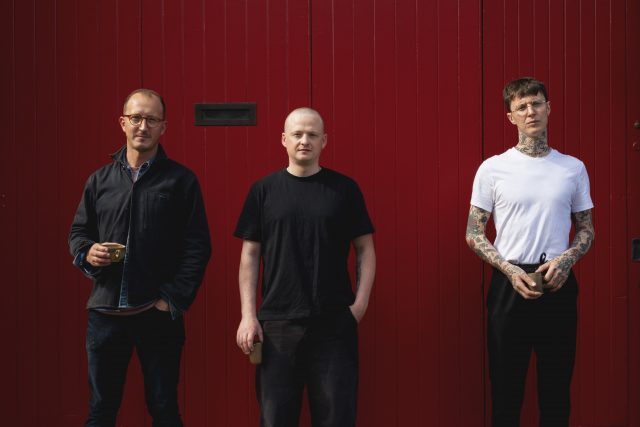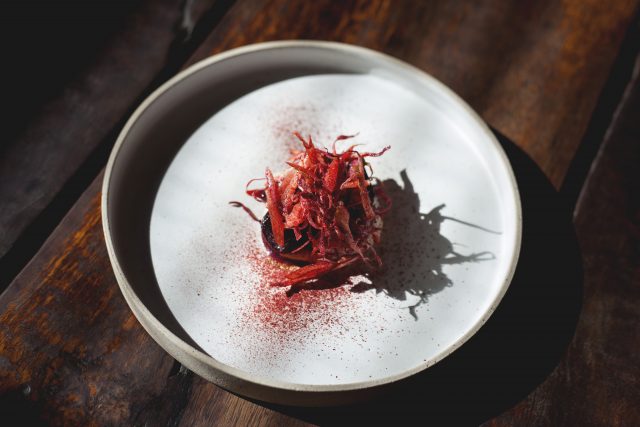This website uses cookies so that we can provide you with the best user experience possible. Cookie information is stored in your browser and performs functions such as recognising you when you return to our website and helping our team to understand which sections of the website you find most interesting and useful.
Unfiltered: Joseph Radford
Located in a warehouse once used as a store for costumes and props, Timberyard is a family-run restaurant in Edinburgh, with Joseph Radford as the mind and palate behind the drinks. He talks to Douglas Blyde about taking a clean approach to natural wines which are largely drawn from Europe…

What is your vintage?
I was born in Edinburgh in 1987. A pretty terrible vintage through most of Europe. Three notable wines that I have tasted from that year are a beautiful Vin Jaune from Château d’Arlay. Trevallon Rouge, which is nearly always a safe bet with age, and Domaine Huet Vouvray Pétillant, a wonderfully aged sparkling Chenin.
How many covers are there at Timberyard?
On a busy evening we are serving around 60 guests. The space is large but the tables are well spaced and we try to allow three hours per booking slot.
What is your guiding ethos in curating the list?
Organic grapes at a bare minimum and a hands-off approach in the winery too. Transparency is very important. As are social morals. Of course, the wine needs to taste good too, and make you feel energised as opposed to sluggish.
What are examples of standout producers, and have you met most of them?
This is very difficult, like choosing a favourite child. Amongst the team, we have visited a decent number of the producers and are looking forward to getting back to Europe now that travel restrictions are easing. A few favourites include the singular wines of Rudi Trossen; the numerous age-worthy cuvées from Cantina Giardino; the haunting aromatics of Le Coste di Gradoli, and the purity of Domaine Belluard.
What does the brown text in the list signify?
These are white wines made with extended skin maceration. It’s important for me that they still sit in the “white” section as they are, ultimately, expressions of white grapes. A delicate extraction of Pineau d’Aunis will still sit in the “red” section next to a more lengthy extraction of Nebbiolo; why should it be different for white wines?
Describe your approach to selecting sparkling wines?
We like to focus on both traditional method sparkling wines and wines produced with the ancestral method. This gives our guests a spread of style and value across all the countries we work with in Europe. In the last year or so, we have definitely steered back towards the Champagne method as our preferred style. In terms of sparkling wines from the British Isles, we only work with a handful of producers who, first and foremost, must be working kindly with land and grape. Tillingham and Ancre Hill are two such producers. With production being relatively small these wines come and go with supply throughout the year.
Could we describe your list as Scotland’s most charismatic and depthful compendium of naturally-inclined wines?
Wow, I guess so. In terms of wines produced in a “natural” manner, this might perhaps even be true for the whole of the UK.
Are some guests resistant to natural wine?
Of course. Mainly because there are a lot of poorly made natural wines. “Natural” is not a byword for quality. Cloudy juice in a clear bottle is not a focus for us at Timberyard. There are a few slightly more feral and wonderfully wild wines on the list, but we generally focus on the cleaner end of the spectrum. Fine wines that just so happen to be made in a very honest manner.
To me, natural wine simply opens up the spectrum of available flavours. We can still get pure expression of fruit and whistle clean wines. Some of the greatest wines in the world are produced “naturally”. Our job is to find the perfect bottle for each of our guests.
What wines are you likely to be adding and subtracting in the future?
With so many of our listings being purchased on strict allocations, the list changes weekly. We receive new wines every week and are fortunate to have the space to allow the bottles to settle for six months or so before listing. A large parcel of De Moor Chablis from 2018 will be looked at shortly. We are also having a big push to relook at the £30-50 bracket so we can offer a broader range of options at the more affordable end of the scale too.
How does a wine charm you?
Energy is really important to us at Timberyard. With that in mind, the acid line and texture of a wine is vital when selecting references for the list and pairing.
What grape or style of wine could you happily do without?
We have no need for blush, Provence-style rosé on the dining table here at Timberyard. But, in the South of France, on a terrace, I’m sure a similar bottle would make many people very happy.

What has been a standout wine pairing with a dish by your head chef, James Murray?
James, who joined us in September 2021, previously spent a number of years travelling the world working at the likes of Le Manoir, Nur Hong Kong (RIP) and, more recently, Lyle’s in London. We recently paired Mythopia’s Clockwork Orange with celeriac, Lanark blue, hazelnut and spruce. A Pinot Noir from Switzerland with Vin Jaune qualities, aged for 10 years in barrel not topped up. The colour has all dropped out and it pours the most beautiful orange hue. It was perfect.
Can you match wines with pickled elements?
Yes, it’s just important to play off the style of pickle. Sometimes looking for a wine with a touch of residual sugar is your best tool. The Chenins of Angeli or Bellivière can be a great place to start.
How much of the larder is sourced from Scotland?
The vast majority, but it is important to also focus on the seasonal waves in Europe too. We are at the tail end of citrus season in the Mediterranean and we have fully embraced this whilst it is available to us. The most beautiful bergamot, Amalfi lemon, blood orange, clementine… We make the most of this on the bar too. Preserving huge quantities to see us through times when these fruits are harder to come by. As well as the drinks pairing, we offer a soft pairing for our full tasting menu. Juices, infusions, vinegars, kombuchas and other fermented softs all play their part.
Who has been your mentor?
Many people have inspired and guided me through my professional career. Since meeting Charlie Mellor of The Laughing Heart in London, I have learnt a huge amount. His passion for real wine and his unending warmth on the dining room floor is beyond inspirational.
What is your life motto?
I have a five year old boy who is growing up much too quickly. It has made me realise just how important the moment is. Mindfulness and an appreciation for what might appear trivial is a very special tool.
How does the setting of the dining room at Timberyard, including fire and music, enhance the enjoyment of wine?
There needs to be subtlety to these sorts of adjuncts. Too much and it can overpower the finer nuances. Too little and it leaves our dining room feeling vacuous. Our lights are low to heighten the other senses; ambient music plays in the background and the fire gently crackles. It’s all rather romantic.
Tell us something surprising about yourself?
I don’t drink alcohol. I taste and spit. My palate has never been sharper.
Who should prospective team members contact if they want to join your team?
An email to me (jo@timberyard.co) is the best way. An eagerness to learn and graft is very important. Our stock holdings almost double when we take into account cellar reserve wines; so there is a lot to dig your teeth into if you are keen to learn…
Timberyard – 10 Lady Lawson Street, Edinburgh, EH3 9DS; 07583 193 652; timberyard.co

